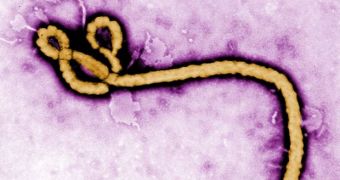In a recent report, a team of scientists with the US Army Medical Research Institute of Infectious Diseases detail their work testing a new compound designed to fight the deadly Ebola virus and keep it from infecting the body.
The specialists explain that, in a series of experiments, they administered this compound, dubbed GS-5734, to non-human primates. More precisely, the team say they worked with rhesus monkeys, which they chose because their biology is very similar to ours.
The experiments went better than expected
In this trial, the novel compound was shown to deliver 100% protection against the Ebola virus. The researchers say that, of the rhesus monkeys that were administered GS-5734 three days after having exposed to the virus, all escaped being killed by the disease.
Apparently, this happened because the compound blocked the virus's ability to replicate inside the body. As a result, although they had been exposed to the virus, neither of the monkeys got sick enough for the infection to kill them.
Thus, the scientists say that, after having been administered GS-5734, the animals started feeling better. Internal bleeding and tissue damage were reduced, and the animals survived.
“The compound, which is a novel nucleotide analog prodrug, works by blocking the viral RNA replication process. If the virus can't make copies of itself, the body's immune system has time to take over and fight off the infection,” said researcher Travis Warren.
Interestingly, another set of laboratory tests carried out as part of this investigation revealed that the compound can also fight other pathogens such as the Lassa virus, the Middle East Respiratory Syndrome virus and the Marburg virus, the research team claim.
The compound should be made into a treatment
Given the encouraging results of these experiments on rhesus monkeys, the scientists behind this investigation argue that GS-5734 should be made into a proper treatment against Ebola.
To date, the Ebola epidemic in West Africa has infected around 28,000 people and killed over 11,000, Science Daily informs. The World Health Organization says things are under control, but cases are still popping up.
Although there are plenty of scientists working on a vaccine against this disease or at least a treatment of sorts, the concoctions being tested are all still in their clinical trial phase.

 14 DAY TRIAL //
14 DAY TRIAL //